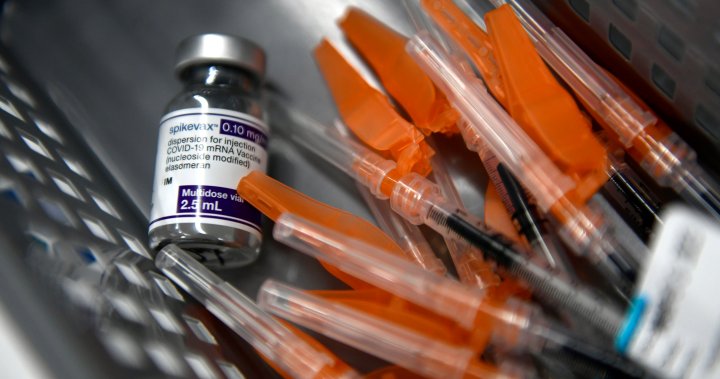Public health officials say the number of COVID-19 infections is climbing again — just in time for respiratory virus season in the fall and winter, when respiratory syncytial virus and influenza also come on the scene.
Health Canada recently authorized an updated mRNA COVID-19 vaccine, manufactured by Moderna, that targets the XBB.1.5 Omicron subvariant circulating now. The federal government is sending the new vaccine out to the provinces and territories, which are in charge of rolling it out to the public.
“I think the timing is going to be good,” said Dr. Jeffrey Pernica, head of the division of infectious disease at McMaster University in Hamilton.
“The incidence of COVID-19 has started to creep back up.”
But it’s clear that many Canadians are tired of getting COVID-19 vaccines — according to the Public Health Agency of Canada, only 22 per cent of people five years and older got the bivalent booster dose, which offered protection against the Omicron variant in addition to the original coronavirus strain.
So why should Canadians roll up their sleeves again? Here’s what doctors and scientists say you need to know.
Which updated COVID-19 vaccines are available in Canada?
Moderna’s Spikevax mRNA COVID-19 vaccine, updated to target the XBB.1.5 subvariant of Omicron, is approved for people aged six months and older.
But Health Canada is also reviewing updated versions of two more COVID-19 vaccines.
One is Pfizer-BioNTech’s Comirnaty vaccine, which was designed to target XBB.1.5 and was approved by the FDA in the U.S. earlier this month.
The other is a non-mRNA option. Novavax has updated its protein subunit vaccine to target XBB.1.5 as well. The company is still waiting for FDA approval in the U.S.
How the new vaccine works
The updated vaccines specifically target the coronavirus subvariants that are circulating right now, which are “pretty different from the original recipe,” said Angela Rasmussen, a virologist at the Vaccine and Infectious Disease Organization at the University of Saskatchewan.
The last boosters were bivalent formulas that targeted both the original strain of coronavirus and BA.1 or BA.5, which are subvariants of the Omicron variant.
But the XBB subvariants, which are the main strains appearing in Canada right now, are derivatives of Omicron BA.2 — and that subvariant wasn’t targeted by the prior bivalent booster, Rasmussen said.
So even if you got the bivalent booster, it’s still worth getting the new shot targeted to XBB.1.5, she said.

“That’s going to provide people with two things. It’s going to provide them with a temporary boost in protection against infection,” Rasmussen said. “That’s going to be antibodies that booster elicits that are going to be more specific than the ones they already have from the vaccines they’ve had so far.”
More importantly, the vaccine will provide longer-lasting “additional protection against developing severe disease,” she said.
Dr. Lawrence Loh, executive director of the College of Family Physicians of Canada, agrees.
“The thing is that the variants have changed. So it’s best to get this one to be up-to-date with what’s happening … right now,” said Loh, who is also a family physician and the former medical officer of health for Peel Region, west of Toronto.
But what if I got infected this year? Do I still need the vaccine?
It’s true that many people may have some hybrid immunity (dual protection from a combination of vaccination and infection) to COVID-19, doctors say.
But immunity wanes over time — so if it’s been six months or longer since you were last infected or boosted, then getting the updated vaccine is a good move to bring your protection back up this fall and winter, said Dr. Theresa Tam, chief public health officer of Canada, in a Sept. 12 news conference.
In addition, the immunity-boosting effect of infection varies from person to person, said Rasmussen.
“If you got infected in the last year, you probably did get infected with one of the XBB subvariants. But for some people that will act like a booster (shot), but for other people it might not. And you don’t know which one you’re going to be,” she said.
“Getting that booster guarantees that you are going to have that extra protection.”
What about the flu and RSV?
In addition to the COVID-19 vaccine, flu shots will be available across the country this fall.
Like the updated COVID shot, the flu vaccine is formulated to be the best possible match for the strains of the virus that are expected to be circulating. Even though some people may still get the flu if they’re vaccinated, it still protects against severe illness, doctors say.
It is safe to get both the COVID-19 booster and the flu shot at the same time, the Public Health Agency of Canada said.
Getting both vaccines won’t affect their immunological effectiveness, Rasmussen said, noting that health-care providers may give one shot in each arm just to minimize soreness.
Health officials are hoping that the convenience of getting the two shots at the same time will increase uptake of both vaccines.

“I think what we sort of leave out when we think about why people don’t get vaccinated is logistics,” said Dr. Kumanan Wilson, chief scientific officer at the Bruyere Research Institute in Ottawa and an immunization researcher. “Make access as easy as possible.”
Health-care professionals are hoping to avoid the “tripledemic” that overwhelmed hospitals and doctor’s offices last fall.
However, there is currently no RSV vaccine available for children, who were hit hard by the virus last year. There is a new RSV vaccine called Arexvy, manufactured by GSK, available this year for adults 60 years of age and older. But it’s not yet clear how widely available that will be.
When can I get the shots?
The exact timing varies between the provinces and territories, but both the flu shot and the updated COVID-19 vaccine are expected to be available in most of the country sometime in October.
Some provinces and territories, including Ontario, Saskatchewan and Northwest Territories, are first vaccinating high-risk populations, including seniors living in long-term care and retirement homes, before making the COVID and flu shots available to the general public.
Doctors and scientists agree that it’s especially critical that vulnerable populations like these are prioritized for vaccination.




